
Detroit 'Longtime' Boys Coaches Down to Few
By
Tom Markowski
Special for Second Half
December 14, 2016
Gary Fralick considers himself one of the fortunate ones.
 Fralick, 66, is in his 32nd season as a head boys basketball coach. He retired from his teaching position in 2013. He started coaching at Redford Thurston in 1979, went to Royal Oak Kimball in 1984 and is in 23rd season as the head coach at Troy.
Fralick, 66, is in his 32nd season as a head boys basketball coach. He retired from his teaching position in 2013. He started coaching at Redford Thurston in 1979, went to Royal Oak Kimball in 1984 and is in 23rd season as the head coach at Troy.
Fralick might be lucky, but he is unquestionably rare. Fralick is believed to be one of three coaches in the Macomb/Oakland/Wayne area who has coached for more than 30 seasons.
There’s Dan Fife at Clarkston and Kevin Voss of Clinton Township Chippewa Valley, both of whom in their 35th seasons, all at the same school.
Another, Greg Esler at Warren DeLaSalle, is in his 30th season. He was the head coach at St. Clair Shores Lake Shore for seven seasons before going to DeLaSalle in 1994.
“We’re part of a dying breed,” Voss said.
It certainly appears so. Coaching longevity has taken on a different meaning recently. Twenty seems like a lot in these times, and in reality it is a long time. Twenty years or so ago, 20 years was normal. There’s a new normal, and 20 or 25 years isn’t it.
Many factors have contributed to this change. A person’s personal and family life often don’t coincide with the demands of coaching basketball. The responsibilities that come with coaching have increased. Some coaches say that to be an effective coach, it can be a 10- or 11-month job.
Two factors are at the forefront, and they are both financial. Coaches used to be educators as well as coaches. Yes, coaching can be viewed as teaching on the court, but at one time teaching in a classroom and coaching used to go hand in hand.
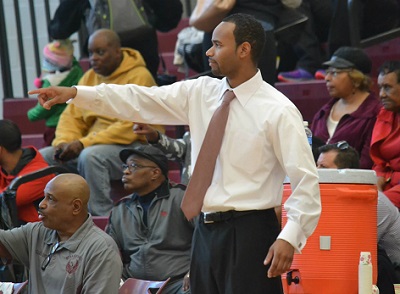 Then there’s the subsidy coaches receive. It varies from school district to school district. Some make $4,000 a season, others can make $7,000. And it also costs money to run a program; unless the coach receives financial help from a booster club or parents, the money he or she receives begins to dwindle.
Then there’s the subsidy coaches receive. It varies from school district to school district. Some make $4,000 a season, others can make $7,000. And it also costs money to run a program; unless the coach receives financial help from a booster club or parents, the money he or she receives begins to dwindle.
But the most important factor is time.
“A tremendous amount of time is devoted to watching DVD or tapes,” Fralick said. “I know I’m dating myself with saying that. The point is, you’re watching a lot. There’s more scouting. And you don’t get paid much. Why don’t they stay as long as they used to? They get burned out. They want to spend more time with their families.
“You don’t see as many of the young coaches stay. Coaches don’t have the ambition to coach a long time. It’s not a profitable job. I don’t know what other coaches make. We used to compare what we made. Not anymore.
“Thirty years or more? I don’t see it happening. There’s the dual job thing. Things have changed. To me, it’s been a great job.”
To compensate for being away from home, Fralick brought his family with him. Sort of. He coached his son Gary, Jr., and Tim. Gary, a 1996 Troy graduate, played for his father his junior and senior seasons and Tim, a 1999 graduate, played four seasons on varsity. Fralick said he was even more fortunate to coach both on the same team (during the 1995-96 season).
Then there’s his wife, Sharon, who remains the scorekeeper.
“I’ve always had a passion for coaching and teaching,” Fralick said. “I love the game of basketball. I love the kids. There’s never a dull moment. It’s been a great ride.”
Vito Jordan has been around basketball all of his life. His father, Venias Jordan, was the boys head varsity coach at Detroit Mackenzie and Detroit Mumford before stepping down as a head coach only to return to the bench assisting his son the last six seasons.
Vito Jordan, 31, became a head coach at Detroit Osborn when he was 24. He started his coaching career the year before as an assistant to Henry Washington at Macomb College. Jordan went to Detroit Community after one season at Osborn and guided Community to its only MHSAA Finals appearance (Class B, 2013). He’s now in his fourth season as the head coach at Detroit Renaissance.
“I followed my father all of my life,” Jordan said. “I knew what I wanted to do when I was in college (Alma College). This is what I want to do the rest of my life.”
It’s different in Detroit. Schools close. Job titles change. Jordan, for instance, teaches at the Academy of Warren, a middle school in Detroit. It’s a charter school, not within the Detroit Public School system, therefore he receives his pay from two separate school systems (Renaissance is in the DPS).
There is a distinction. In some school systems coaches will receive a percentage – let’s say for argument sake, 10 percent – of their teaching salary to coach. Let’s say a person makes $60,000 a year to teach. He or she would then receive $6,000 to coach. If you coach two sports, that’s $12,000.
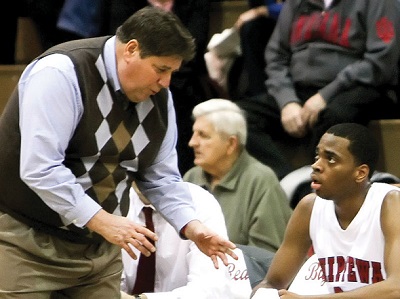 Jordan is not privy to such a contract. Each job is separate. Jordan loves to coach, and he understands he must be a teacher to earn a decent living, and he’s content to continue on the path he is following. But he also knows that to make a good salary just coaching one must move on to the collegiate level like others have done.
Jordan is not privy to such a contract. Each job is separate. Jordan loves to coach, and he understands he must be a teacher to earn a decent living, and he’s content to continue on the path he is following. But he also knows that to make a good salary just coaching one must move on to the collegiate level like others have done.
“When there were coaches like my dad, Perry Watson (Detroit Southwestern), Johnny Goston (Detroit Pershing) and others, they all worked in the (Detroit Public) school system. Everyone was teaching. That was your career. None of them had aspirations of being a college coach. Not even Watson. Now everyone isn’t in the teaching profession. Maybe they do have a degree and maybe they don’t. The point is, most aren’t teachers. I can count on one hand those (in Detroit) who have their teaching certificate and coach.”
Jordan noted such successful PSL coaches like Derrick McDowell, Steve Hall and Robert Murphy who left high school to pursue a coaching career in college. Murphy guided Detroit Crockett to the Class B title in 2001 and is now the head coach at Eastern Michigan. McDowell has had two stints as a collegiate assistant coach, most recently at EMU. He’s since returned to coach at Detroit Western. Hall coached Detroit Rogers to three consecutive Class D titles (2003-05) before going to Duquesne University and Youngstown State as an assistant coach. Hall returned to Detroit last season and is in his second season as head coach at Detroit Cass Tech.
Jordan said they left high school to challenge themselves professionally, among other considerations. Voss said there are variables that influence how long a person lasts, in one school district or in coaching in general, that didn’t exist 20 years ago.
“Athletics have become pervasive in high school,” he said. “The whole booster situation you find in college is here. You can be winning but not winning enough. It’s a trickle down affect.
“Coaches complain about parents. Parents complain about playing time. High school sports is not as pure as it once was. Winning is way more important now. Now a coach comes in with a three-year window. You can have one or two down years, and the third you’d better win.
“Then there’s the pressure on your family. I’ve been lucky. My wife and I have had the players over for team dinners. We create a family atmosphere. It’s a change of society. I don’t envy the young coaches coming in.”
Community involvement has always been a priority for Voss. To keep a hand on the pulse, Voss heads the elementary basketball program within the Chippewa Valley school district. Games are held on Saturdays, and approximately 750 students take part.
“You have to have the right fit,” he said. “I’m in the right spot. You coach for different reasons when you get older. I’m enjoying the game. There’s a different level of satisfaction.”
 Tom Markowski is a columnist and directs website coverage for the State Champs! Sports Network. He previously covered primarily high school sports for the The Detroit News from 1984-2014, focusing on the Detroit area and contributing to statewide coverage of football and basketball. Contact him at [email protected] with story ideas for Oakland, Macomb and Wayne counties.
Tom Markowski is a columnist and directs website coverage for the State Champs! Sports Network. He previously covered primarily high school sports for the The Detroit News from 1984-2014, focusing on the Detroit area and contributing to statewide coverage of football and basketball. Contact him at [email protected] with story ideas for Oakland, Macomb and Wayne counties.
PHOTOS: (Top) Troy boys basketball coach Gary Fralick, left, is in his 32nd season coaching. (Middle) Detroit Renaissance boys coach Vito Jordan is following in the coaching footsteps of his father, Venias. (Below) Chippewa Valley boys coach Kevin Voss, left, is in his 35th season at his school. (Top and below photos courtesy of C&G Newspapers; middle photo courtesy of Detroit Public School League.)
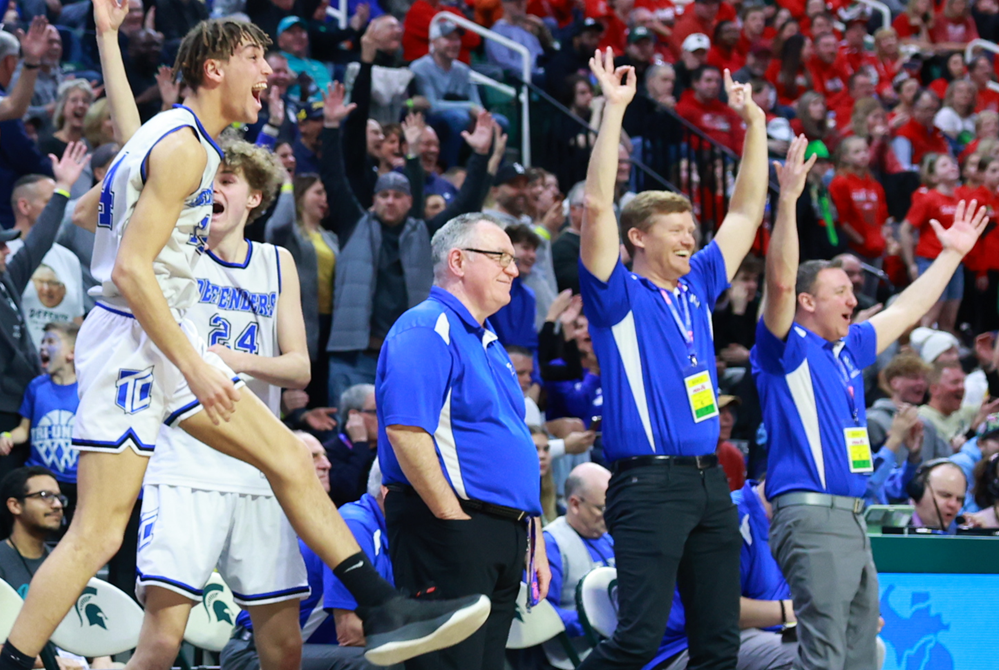
Championship Experience from Coach's Point of View Unimaginable, Unforgettable
By
Dean Holzwarth
Special for MHSAA.com
April 4, 2024
WYOMING – As the final buzzer sounded, it was all I could’ve imagined – and more.

In the weeks leading up to March 16 and the Division 4 championship game, I experienced every emotion possible as I envisioned what it would feel like to be an assistant coach on the bench at Michigan State’s Breslin Center as the Wyoming Tri-unity Christian boys basketball team achieved its ultimate goal.
In my first year as the junior varsity coach at Tri-unity, I had been on the varsity bench for a majority of the season, assisting legendary coach Mark Keeler and fellow assistants Brent Voorhees, Bob Przybysz and Mike Kaman.
I was there encouraging, motivating and supporting the varsity team. It was a role I embraced, and had become accustomed to over my almost 30 years coaching high school basketball.
I started coaching in 1995 as Jim Ringold gave me my first opportunity as the freshmen girls coach at Wyoming Kelloggsville High School. I would then coach Kelloggsville’s freshmen boys team for eight seasons, while also coaching the freshmen girls at Grandville High School. I would also coach the junior varsity teams at both schools.
I love coaching. I have a passion for it. I’ve always enjoyed getting the most out of my players while creating a bond between player and coach.
When girls basketball season moved from fall to winter joining the boys in 2007-08, I stayed at Grandville. I spent 21 seasons there before stepping down.
I still wanted to coach, and I heard that the Tri-unity junior varsity position was available. I had always respected and liked Keeler and was excited for the prospect of joining a perennial powerhouse.
I didn’t really know about Tri-unity growing up in the Wyoming Park school district. But as a young kid, I would rush home and eagerly await the afternoon delivery of the Grand Rapids Press. I would quickly find the sports page and read it from front to back, hoping one day to see my byline.
I began writing for the Press’ sports department in 1997. It was my dream job. And that’s also when I first started covering Tri-unity boys basketball.
I remember watching eventual NBA all-star Chris Kaman, along with Bryan Foltice and others play for this little Christian school and have unbridled success under Keeler.
MHSAA Tournament runs became the norm for the Defenders. They won their first Finals title in 1996, and they would claim four more over the next 26 years. They also had six runner-up finishes.
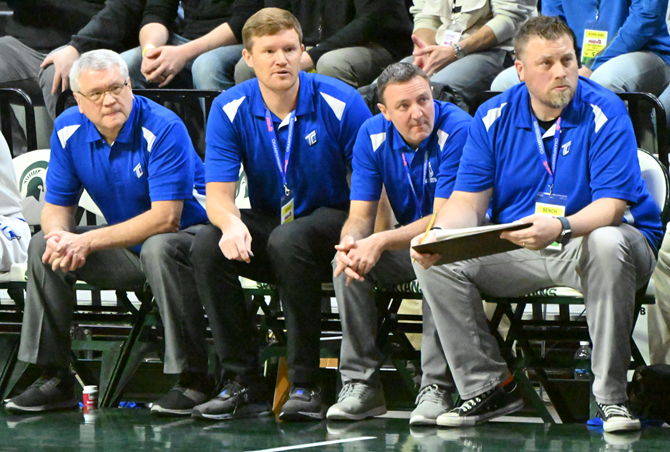 I was sitting on media row writing for MHSAA.com in 2022 when Brady Titus led Tri-unity to its fifth state championship.
I was sitting on media row writing for MHSAA.com in 2022 when Brady Titus led Tri-unity to its fifth state championship.
I never thought that two years later I would be on the coaching staff as the Defenders pursued another one. But there I was.
I knew this year’s team had the potential to be special.
Tri-unity had returned four of its five starters from a year ago, after suffering a heart-breaking two-point loss to Munising in the Division 4 Final.
Eight seniors were on the roster. The team had a mix of talented guard play, senior leadership, size and depth. We had shooters and we played great defense, a trademark of Keeler’s teams.
This was the year, and that heaped lofty expectations on Keeler and the team. It was basically “state championship or bust.” Anything less would be considered a disappointment.
Keeler wanted it badly, and I knew the players did as well. I think they felt the pressure at times of living up to the expectations that had been set.
We had several lopsided wins, but also had a few tough losses to Division 2 and Division 3 teams – Grand Rapids Forest Hills Central, Wyoming Lee, Grandville Covenant Christian and Schoolcraft – all talented teams that I think made us better despite falling short.
As the postseason started, there was anxiety and excitement.
We were one of the favorites, but it wouldn’t be easy. We would have to earn each of the seven victories needed to win it all.
First came a District title, but then we had to play a quality Fowler team in its home gym in the Regional Semifinal. This was a game we knew would be a challenge – and it was.
We led by only one at halftime after a 7-0 run to end the second quarter. The score was tied 33-33 in the fourth quarter before senior Lincoln Eerdmans made a key 3-pointer to spark our victory.
As we went through the handshake line, several Fowler players said, “Good luck in the Finals.”
Our defense played extremely well in the Regional Final and state Quarterfinal to secure our team another trip to the Breslin.
St. Ignace was our opponent in the Semifinal, and we had to face a senior guard who could do it all – Jonny Ingalls. He lived up to the hype. He was good, and we didn’t have any answer for him in the first half. We trailed by one, only to fall behind by seven late in the third quarter.
Was this the end? Were we going to fall one game short of our goal?
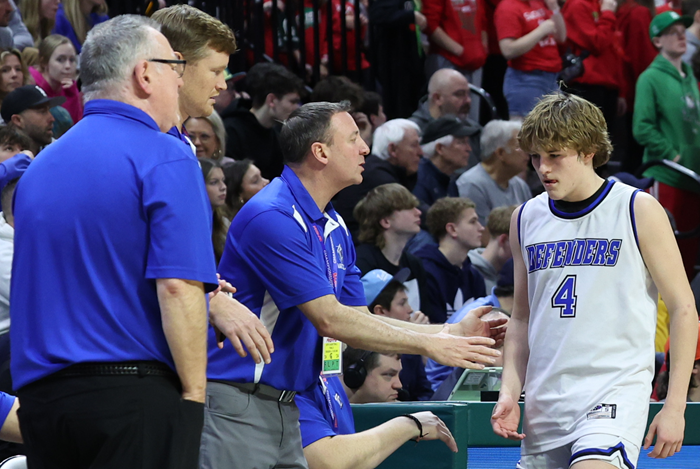 We were down by five points in the fourth quarter, but junior guard Keaton Blanker, and others, rose to the occasion. We rallied to win a tight one, and now we were one win away from a Division 4 title.
We were down by five points in the fourth quarter, but junior guard Keaton Blanker, and others, rose to the occasion. We rallied to win a tight one, and now we were one win away from a Division 4 title.
The night before the championship game, we stayed at a hotel in East Lansing as we had the first game of the day at 10 a.m. We had a team dinner, and the players seemed relaxed and eager to close out the season the way they had intended.
There was one thing that worried me. We were playing Mount Pleasant Sacred Heart. A team we had played in the second game of the season and defeated by 30 points.
Would we be overconfident? I had no idea. They were a different team now, but so were we. Anything could happen.
Keeler gave a spirited and emotional pregame speech. In last year’s loss to Munising, he felt like the team played not to lose, and this season his big thing was “I want to win.” He said it to every starter that Saturday morning during the final moments in the locker room before tipoff, asking all five individually to say it back – which they did, the first one quietly but followed by teammates replying louder and louder as everyone got fired up and “I want to win” rang through the locker room. I think it inspired all of us.
After a competitive first quarter, we started to find our rhythm and expanded the lead. We were ahead by double-digits at the half, and a state title was within our grasp. Senior Wesley Kaman buried a 3-pointer in the final seconds of the third quarter to give us a 20-point cushion. It was at that point I knew we were going to win.
All five starters reached double-figure scoring, led by Jordan VanKlompenberg with 19 points and Owen Rosendall with 14. That balance was intentional and a successful sign for our team all season.
The exhilaration of winning was intoxicating. I loved watching the boys celebrate something they had worked so hard to accomplish. I will never forget their faces. I looked to my right from my seat on the bench and watched them running onto the court, just wearing their joy. They were just elated.
I was so happy for Keeler, a devout Christian who is respected by so many people in high school basketball circles. I learned so much from him this season. The way he approaches each game, his competitiveness. He instills his strong faith in his players and understands that the game of basketball is a bridge to a higher purpose.
Keeler is the fourth-winningest coach in state boys basketball history with a record of 694-216, and will be the winningest active coach next winter as all-time leader Roy Johnston retired from Beaverton at the end of this season.
The tournament run was one of the best coaching experiences I have had, and I feel blessed to have had the opportunity to be a part of a state championship season.
 Dean Holzwarth has covered primarily high school sports for Grand Rapids-based WOOD-TV for five years after serving at the Grand Rapids Press and MLive for 16 years along with shorter stints at the Ionia Sentinel and WZZM. Contact him at [email protected] with story ideas for Allegan, Kent and Ottawa counties.
Dean Holzwarth has covered primarily high school sports for Grand Rapids-based WOOD-TV for five years after serving at the Grand Rapids Press and MLive for 16 years along with shorter stints at the Ionia Sentinel and WZZM. Contact him at [email protected] with story ideas for Allegan, Kent and Ottawa counties.
PHOTOS (Top) The Wyoming Tri-unity Christian bench, including the author (far right) and head coach Mark Keeler (middle), celebrate a 3-pointer late in the Defenders’ Division 4 championship win over Mount Pleasant Sacred Heart. (Middle) Tri-unity’s assistant coaches, including Holzwarth (second from right), monitor the action. (Below) Holzwarth and the coaching staff greet Keaton Blanker (4) as he comes off the floor. (Photos by Hockey Weekly Action Photos.)

